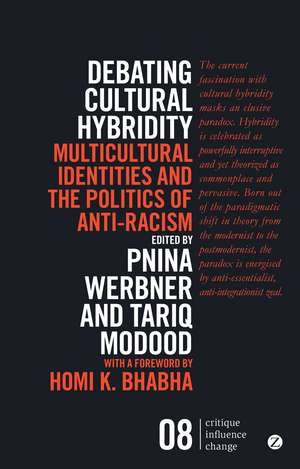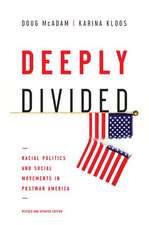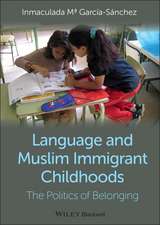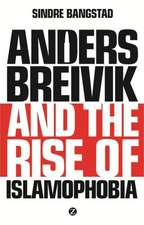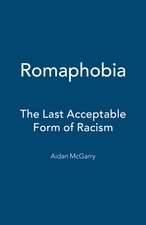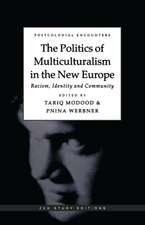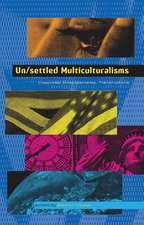Debating Cultural Hybridity: Multicultural Identities and the Politics of Anti-Racism - New Edition: Critique. Influence. Change
Editat de Pnina Werbner, Tariq Modood Cuvânt înainte de Homi K. Bhabhaen Limba Engleză Paperback – 14 feb 2015
In this era where nearly everyone at least pays lip service to the importance of multiculturalism, why is it still so difficult to negotiate differences across cultures? Why does racism still persist—and how does it strike at the foundations of multiculturalism?
Bringing together some of the world’s most influential postcolonial theorists, Debating Cultural Hybridity examines the place and meaning of cultural hybridity in our ever-more-connected, yet crisis-ridden and xenophobic world. Taking as its starting point the fact that personal identities are themselves multicultural, the contributors illuminate the complexity and flexibility of culture and identity, defining their potential openness as well as their closures, to show why anti-racism and multiculturalism remain so difficult to fight for, even today.
Bringing together some of the world’s most influential postcolonial theorists, Debating Cultural Hybridity examines the place and meaning of cultural hybridity in our ever-more-connected, yet crisis-ridden and xenophobic world. Taking as its starting point the fact that personal identities are themselves multicultural, the contributors illuminate the complexity and flexibility of culture and identity, defining their potential openness as well as their closures, to show why anti-racism and multiculturalism remain so difficult to fight for, even today.
Preț: 153.88 lei
Nou
Puncte Express: 231
Preț estimativ în valută:
29.45€ • 30.63$ • 24.31£
29.45€ • 30.63$ • 24.31£
Carte în stoc
Livrare din stoc 05 martie
Preluare comenzi: 021 569.72.76
Specificații
ISBN-13: 9781783601615
ISBN-10: 1783601612
Pagini: 320
Dimensiuni: 140 x 216 x 25 mm
Greutate: 0.38 kg
Ediția:Nouă
Editura: ZED BOOKS
Colecția Zed Books
Seria Critique. Influence. Change
Locul publicării:London, United Kingdom
ISBN-10: 1783601612
Pagini: 320
Dimensiuni: 140 x 216 x 25 mm
Greutate: 0.38 kg
Ediția:Nouă
Editura: ZED BOOKS
Colecția Zed Books
Seria Critique. Influence. Change
Locul publicării:London, United Kingdom
Notă biografică
Pnina Werbner is professor emerita in social anthropology at Keele University. Tariq Modood is professor of sociology, politics, and public policy at the University of Bristol.
Cuprins
Foreword by Homi K. Bhabha
Preface to the critique influence change edition
Preface to the first edition
Introduction: The Dialectics of Cultural Hybridity
Pnina Werbner
Part One: Hybridity, Globalisation and the Practice of Cultural Complexity
1. From Complex Culture to Cultural Complexity
Hans-Rudolf Wicker
2. The Making and Unmaking of Strangers
Zygmunt Bauman
3. Identity and Difference in a Globalised World
Alberto Melucci
4. Global Crises, the Struggle for Cultural Identity and Intellectual Porkbarrelling: Cosmopolitans versus Locals, Ethnics and Nationals in an Era of De-hegemonisation
Jonathan Friedman
5. 'The Enigma of Arrival': Hybridity and Authenticity in the Global Space
Peter Van Der Veer
6. Adorno at Womad: South Asian Crossovers and the Limits of Hybridity-Talk
John Hutnyk
Part Two: Essentialism versus Hybridity: Negotiating Difference
7. Is It So Diffcult to be an Anti-Racist?
Michel Wieviorka
8. 'Difference', Cultural Racism and Anti-Racism
Tariq Modood
9. Constructions of Whiteness in European and American Anti-Racism
Alastair Bonnett
10. Ethnicity, Gender Relations and Multiculturalism
Nira Yuval-Davis
13. Dominant and Demotic Discourses of Culture: Their Relevance to Multi-Ethnic Alliances
Gerd Baumann
14. Essentialising Essentialism, Essentialising Silence: Ambivalence and Multiplicity in the Constructions of Racism and Ethnicity
Pnina Werbner
Part Three: Mapping Hybridity
15. Tracing Hybridity in Theory
Nikos Papastergiadis
Preface to the critique influence change edition
Preface to the first edition
Introduction: The Dialectics of Cultural Hybridity
Pnina Werbner
Part One: Hybridity, Globalisation and the Practice of Cultural Complexity
1. From Complex Culture to Cultural Complexity
Hans-Rudolf Wicker
2. The Making and Unmaking of Strangers
Zygmunt Bauman
3. Identity and Difference in a Globalised World
Alberto Melucci
4. Global Crises, the Struggle for Cultural Identity and Intellectual Porkbarrelling: Cosmopolitans versus Locals, Ethnics and Nationals in an Era of De-hegemonisation
Jonathan Friedman
5. 'The Enigma of Arrival': Hybridity and Authenticity in the Global Space
Peter Van Der Veer
6. Adorno at Womad: South Asian Crossovers and the Limits of Hybridity-Talk
John Hutnyk
Part Two: Essentialism versus Hybridity: Negotiating Difference
7. Is It So Diffcult to be an Anti-Racist?
Michel Wieviorka
8. 'Difference', Cultural Racism and Anti-Racism
Tariq Modood
9. Constructions of Whiteness in European and American Anti-Racism
Alastair Bonnett
10. Ethnicity, Gender Relations and Multiculturalism
Nira Yuval-Davis
13. Dominant and Demotic Discourses of Culture: Their Relevance to Multi-Ethnic Alliances
Gerd Baumann
14. Essentialising Essentialism, Essentialising Silence: Ambivalence and Multiplicity in the Constructions of Racism and Ethnicity
Pnina Werbner
Part Three: Mapping Hybridity
15. Tracing Hybridity in Theory
Nikos Papastergiadis
Recenzii
“It is marvelous to see this early collection of classic insightful articles on hybridity published again, with new introductions.”
“An indispensable classic text for anyone interested in a complex and nuanced analysis of questions of culture, identity, and hybridity.”
“In the globalized world of the twenty-first century, cultural mixing and ethnic cross-fertilization is a commonplace experience. Debating Cultural Hybridity offers a superb set of essays to understand the complexity of this experience and its political and social implications.”
“The reissue of these seminal essays reminds us that the turn to hybridity was never an invitation to celebration, but rather a challenge to think about the necessary conditions for an emancipatory politics. Given the civilizational hierarchy and liberal homogeneity that has informed the racisms of the 'war on terror' era, their exploration of the complex task of building anti-racist alliances remains vital.”
